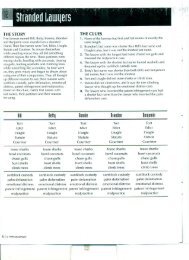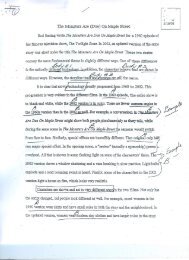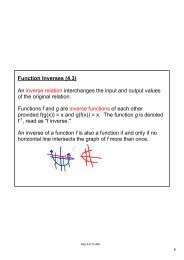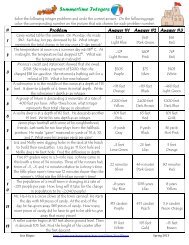Rosencrantz and Guildenstern Are Dead - Cherokee County Schools
Rosencrantz and Guildenstern Are Dead - Cherokee County Schools
Rosencrantz and Guildenstern Are Dead - Cherokee County Schools
You also want an ePaper? Increase the reach of your titles
YUMPU automatically turns print PDFs into web optimized ePapers that Google loves.
st<strong>and</strong>ard of art <strong>and</strong> genius. However, the duration <strong>and</strong> accomplishments of Stoppard's career has finally<br />
affirmed his status as a major playwright. By the time Stoppard had written Jumpers <strong>and</strong> Travesties, Jack<br />
Richardson, writing in Commentary in 1974, had to admit Stoppard's pre-eminence: "since <strong>Rosencrantz</strong> <strong>and</strong><br />
<strong>Guildenstern</strong>, a play I admired but found a little too coy <strong>and</strong> dramatically forced in its darker moments,<br />
Stoppard has come closer <strong>and</strong> closer to a successful wedding of theatrical artistry <strong>and</strong> intelligence. He is<br />
already the best playwright around today, the only writer I feel who is capable of making the theatre a truly<br />
formidable <strong>and</strong> civilized experience again."<br />
In the context of a brilliant career, <strong>Rosencrantz</strong> <strong>and</strong> <strong>Guildenstern</strong> <strong>Are</strong> <strong>Dead</strong> continues to be a formidable<br />
achievement. Even by 1973, Norm<strong>and</strong> Berlin, writing in Modern Drama, could assert that Stoppard's first<br />
major play had "acquired a surprisingly high reputation as a modern classic." And within a decade of its first<br />
appearance, <strong>Rosencrantz</strong> <strong>and</strong> <strong>Guildenstern</strong> <strong>Are</strong> <strong>Dead</strong> had enjoyed over 250 productions in twenty different<br />
languages. Though a number of critics now feel that <strong>Rosencrantz</strong> <strong>and</strong> <strong>Guildenstern</strong> <strong>Are</strong> <strong>Dead</strong> is perhaps not<br />
Stoppard's best play—that some of his later work have been more complex, polished, <strong>and</strong> mature—Stoppard's<br />
first major play remains his most popular <strong>and</strong> his most widely performed.<br />
Character Analysis<br />
<strong>Guildenstern</strong><br />
In Stoppard's play, <strong>Guildenstern</strong> is the more philosophical <strong>and</strong> intellectual of the two courtiers who double as<br />
minor characters in Shakespeare's play <strong>and</strong> major characters in Stoppard's. The opening sequence of coin<br />
tossing vexes <strong>Guildenstern</strong> because he craves order <strong>and</strong> predictability in the universe. The apparent violation<br />
of probability in coin tossing drives him to seek an explanation but he attempts to remain calm when no<br />
satisfactory answers arise. He has a wry sense of humor, can be quite sarcastic, <strong>and</strong> is resilient, though he is<br />
also quick to anger <strong>and</strong> subject to panic or despondency when he finally feels overwhelmed. <strong>Guildenstern</strong><br />
likes to hear himself talk <strong>and</strong> often rambles at length, sometimes without making a lot of sense. He frequently<br />
uses parables <strong>and</strong> analogies to attempt to underst<strong>and</strong> the mysteries that confront him <strong>and</strong> he likes verbal<br />
games as a way of working things out. Wary <strong>and</strong> nervous, he likes to stay in control <strong>and</strong> questions more than<br />
his friend, <strong>Rosencrantz</strong>, whom he often badgers but ultimately is trying to protect <strong>and</strong> support with optimism<br />
whenever possible.<br />
<strong>Rosencrantz</strong><br />
<strong>Rosencrantz</strong> is a minor character in Shakespeare' s Hamlet <strong>and</strong> one of the two major characters in Stoppard's<br />
unusual version of Shakespeare's story. In Shakespeare's play, <strong>Rosencrantz</strong> is one of Hamlet's university<br />
friends from Wittenberg. With <strong>Guildenstern</strong>, he is summoned by King Claudius to come to Denmark because<br />
Hamlet, after returning to Denmark for his father's funeral <strong>and</strong> his mother's wedding, began acting quite<br />
strangely. <strong>Rosencrantz</strong> helps <strong>Guildenstern</strong> spy on Hamlet for Claudius <strong>and</strong> then is assigned with his friend to<br />
take Hamlet to Engl<strong>and</strong> after Hamlet kills Polonius. When Hamlet returns to Engl<strong>and</strong>, he reports to his friend<br />
Horatio that on the ship to Engl<strong>and</strong> he discovered Claudius' s letter ordering his death. He substituted a letter<br />
ordering the deaths of <strong>Rosencrantz</strong> <strong>and</strong> <strong>Guildenstern</strong> <strong>and</strong> escaped the ship when pirates attacked it. In Hamlet,<br />
<strong>Rosencrantz</strong> <strong>and</strong> <strong>Guildenstern</strong> are such nondescript characters that Claudius <strong>and</strong> his queen Gertrude can't<br />
distinguish between them.<br />
In Stoppard's play, <strong>Rosencrantz</strong> is the more timid of the two courtiers <strong>and</strong> considerably less reflective <strong>and</strong><br />
philosophical than his friend, <strong>Guildenstern</strong>. At the beginning of the play <strong>Rosencrantz</strong> is winning on every toss<br />
of the "heads or tails" game <strong>and</strong> is embarrassed to be taking so much money from his friend but is either<br />
oblivious or unconcerned about how unusual this streak of "heads" might be. He is relatively unreflective,<br />
Character Analysis 10
















